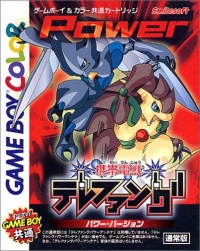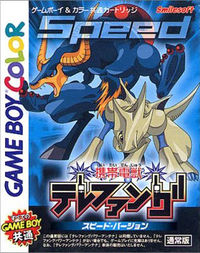Telefang 1: Difference between revisions
No edit summary |
No edit summary |
||
| Line 6: | Line 6: | ||
| image2 = [[Image:Telefang Speed version.jpg|200px]] | | image2 = [[Image:Telefang Speed version.jpg|200px]] | ||
| caption = Box arts of both Power and Speed versions of Telefang 1 | | caption = Box arts of both Power and Speed versions of Telefang 1 | ||
| series = Telefang | |||
| developer = Smilesoft | | developer = Smilesoft | ||
| publisher = Natsume | | publisher = Natsume | ||
| Line 13: | Line 14: | ||
| mode = Single player | | mode = Single player | ||
| platform = Game Boy Color | | platform = Game Boy Color | ||
| media = 16 megabit catridge }} | | media = 16 megabit catridge}} | ||
{{for|the GBA sequel to Keitai Denjuu Telefang|Telefang 2}} | {{for|the GBA sequel to Keitai Denjuu Telefang|Telefang 2}} | ||
| Line 19: | Line 20: | ||
'''Keitai Denjuu Telefang''' {{lang|jap=携帯電獣テレファング|romaji=Keitai Denjuu Terefangu}}, often shortened to '''Telefang 1''' (since there are two games in this series), is a video game for [[wikipedia:Game Boy Color|Game Boy Color]] released by [[Smilesoft]] in Japan. It is available in two versions, namely Power version and Speed version. | '''Keitai Denjuu Telefang''' {{lang|jap=携帯電獣テレファング|romaji=Keitai Denjuu Terefangu}}, often shortened to '''Telefang 1''' (since there are two games in this series), is a video game for [[wikipedia:Game Boy Color|Game Boy Color]] released by [[Smilesoft]] in Japan. It is available in two versions, namely Power version and Speed version. | ||
More well-known, this game has also been bootlegged as a fake Pokemon game, infamous due to its bad quality. ''See [[#Bootleg|the section below]] for details. | |||
==The name== | ==The name== | ||
<!-- this should be in the article for the series, but since we don't have it yet we'll just leave it here first. --> | <!-- this should be in the article for the series, but since we don't have it yet we'll just leave it here first. --> | ||
[[Image:Telefang | [[Image:Telefang logo.gif|thumb|left|Logo of Keitai Denjuu Telefang]] | ||
Keitai means mobile in Japanese, while Den means electric, juu means monster, and [[Telefang]] is a English word in {{w|Katakana}} to mean something like ''Telephone Fangs'' (Fangs as in monsters).<ref name="wikipedia">http://en.wikipedia.org/wiki/Keitai_Denjuu_Telefang. Accessed on 13 January 2008.</ref> | Keitai means mobile in Japanese, while Den means electric, juu means monster, and [[Telefang]] is a English word in {{w|Katakana}} to mean something like ''Telephone Fangs'' (Fangs as in monsters).<ref name="wikipedia">http://en.wikipedia.org/wiki/Keitai_Denjuu_Telefang. Accessed on 13 January 2008.</ref> | ||
| Line 67: | Line 70: | ||
==Bootleg== | ==Bootleg== | ||
{{main|Pokémon Diamond and Jade}} | {{main|Pokémon Diamond and Jade}} | ||
Keitai Denjuu Telefang was originally only available in Japanese. However, certain pirates in China bootlegged it under the name of [[Pokémon Diamond]] and [[Pokémon Jade]]. <ref name="wikipedia" /> The translation | Keitai Denjuu Telefang was originally only available in Japanese. However, certain pirates in China bootlegged it under the name of [[Pokémon Diamond]] and [[Pokémon Jade]]. <ref name="wikipedia" /> The translation consisted of {{w|Engrish}} as well as certain [[profanities]] were also used. This resulted in a poor reception towards the game, leading many people to think it is a {{w|Pokémon}} ripoff. | ||
The sprites and maps remain the same, changing only the text to English. The ability to name the character or the Denjuu was also not present, and the game would also not load a save properly. Many other [[glitches]] were also present. | The sprites and maps remain the same, changing only the text to English. The ability to name the character or the Denjuu was also not present, and the game would also not load a save properly. Many other [[glitches]] were also present. | ||
Revision as of 11:14, 21 July 2008
| Keitai Denjuu Telefang | |
  
| |
| Series | Keitai Denjuu Telefang |
|---|---|
| Developer(s) | Smilesoft |
| Publisher(s) | Natsume |
| Designer(s) | Takagi Toushi |
| Release date | 3 November 2000 |
| Genre | Console role-playing game |
| Platform | Game Boy Color |
- For the GBA sequel to Keitai Denjuu Telefang, see Telefang 2.
- For the Keitai Denjuu Telefang series of games, see Keitai Denjuu Telefang (series).
Keitai Denjuu Telefang (Keitai Denjuu Terefangu), often shortened to Telefang 1 (since there are two games in this series), is a video game for Game Boy Color released by Smilesoft in Japan. It is available in two versions, namely Power version and Speed version.
More well-known, this game has also been bootlegged as a fake Pokemon game, infamous due to its bad quality. See the section below for details.
The name
Keitai means mobile in Japanese, while Den means electric, juu means monster, and Telefang is a English word in Katakana to mean something like Telephone Fangs (Fangs as in monsters).[1]
Plot
In the year 2020 it was possible to travel to the Denjuu world using D-Shots, a special mobile phone. Making friends and sharing telephone numbers with Denjuu became popular among humans.
The protagonist, Shigeki, though originally arrived in the Denjuu world on accident, he became determined to travel the world with his new Denjuu companion, and make more new friends while he was there.
Characters
Humans
- Main article: List of people
- Shigeki () - The protagonist of Telefang 1.
- Matsukiyo () - A child genius who wants to learn more about the Denjuu world. He accidentally gets transported there along with Shigeki.
- Miyo () - A strong-willed girl described as a childhood friend of Shigeki, but teases him about never having been to the Denjuu world. Her Denjuu partner is Suguri.
- Kai () - A mysterious boy encountered during Shigeki's travels, his purpose in the Denjuu world is unclear. In the Power Version, his partner is Angios, while in Speed Version it is Gymnos.
- Sanaeba () - The owner of Sanaeba pharmaceutical company, which was the first to discover the Denjuu world. After their discovery they began to branch their business into other areas, and they control the human-to-Denjuu world gates. While children are allowed in and out for free, adults must pay a fee. Sanaeba seems to have his name attached to many of the problems which have cropped up in the Denjuu world, and is apparently manipulating Denjuu for unknown reasons.
- Nerikara () - A member of Sanaeba who gets people to vote him for prime minister of the Denjuu world by setting up a curry store. The Denjuu seem to have a positive response towards curry.
- Tabasco () - A enemy of Shigeki in the Denjuu world.
Denjuu
- Krypto ()- A strong Denjuu with a hot-tempered personality. It is assigned by Musa as Shigeki's first partner in the Power Version.
- Fungus ()- A swift Denjuu with a faithful personality. It is assigned by Musa as Shigeki's first partner in the Speed Version.
- Musa () - An old, turtle-like Denjuu who is the first to greet Shigeki and Matsukiyo after they arrive in the Denjuu world. He asks for their help with various problems that the Denjuu world is suffering, and introduces Shigeki to his first partner.
- Angios/Gymnos ()- Partners of Kai (Angios in Power Version and Gymnos in Speed Version).
Power and Speed version differences
The two versions, Power and Speed, have some differences:
- In Power version, the starter partner you will have is Krypto but in Speed version it is Fungus.
- There are different Denjuu appearances in the two versions.
- There are some colour differences in the two such as the colour of the D-Shot menu.
- In Paparuna Lake, the order of houses one is required to enter to solve the puzzle is different in Power version than that in Speed version.
Manga
A manga series is available on Kodansha Publishing Ltd. It is based on the first game of the series and it has 3 issues. Some people sell it on the Internet (like Yahoo! Auctions Japan or Amazon Japan).
Sequel
- Main article: Telefang 2
- Main article: Differences between Telefang 1 and Telefang 2
Smilesoft released a sequel to Telefang 1 for the Game Boy Advance, with new Denjuu appearances and a slightly different style of battle, where the player can intervene in a middle of a battle to use items on the Denjuu. Move types were also introduced.
The sprites were also redrawn, and had better graphics and music.
Bootleg
- Main article: Pokémon Diamond and Jade
Keitai Denjuu Telefang was originally only available in Japanese. However, certain pirates in China bootlegged it under the name of Pokémon Diamond and Pokémon Jade. [1] The translation consisted of Engrish as well as certain profanities were also used. This resulted in a poor reception towards the game, leading many people to think it is a Pokémon ripoff.
The sprites and maps remain the same, changing only the text to English. The ability to name the character or the Denjuu was also not present, and the game would also not load a save properly. Many other glitches were also present.
See also
References
- ↑ 1.0 1.1 http://en.wikipedia.org/wiki/Keitai_Denjuu_Telefang. Accessed on 13 January 2008.
| This page uses Creative Commons Licensed content from Wikipedia (view authors). | http://www.wikia.com/images/Smallwikipedialogo.png |